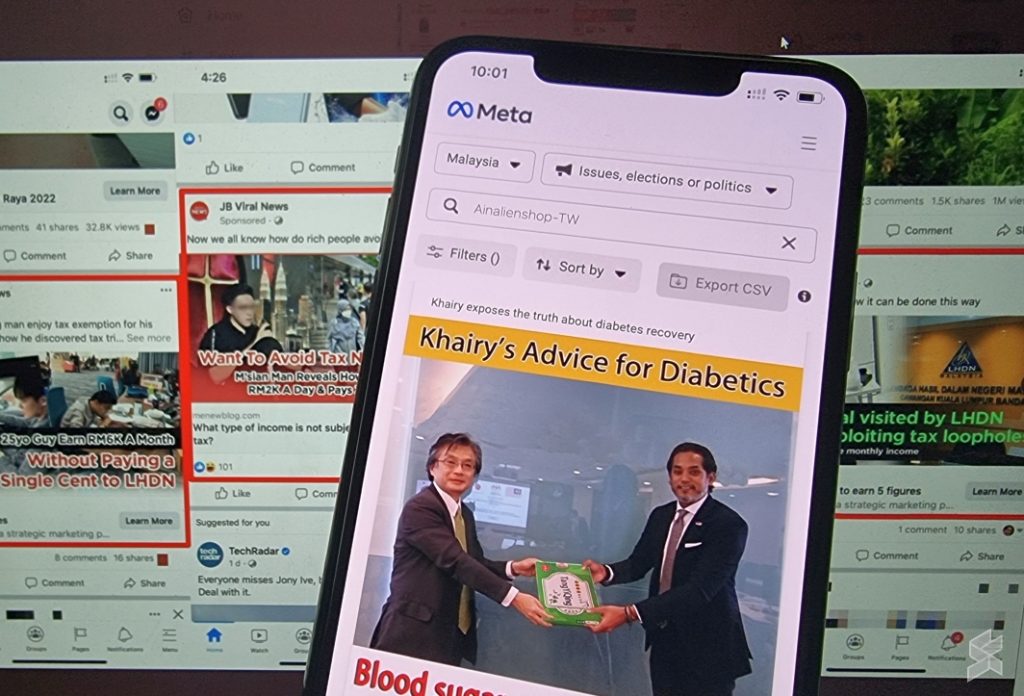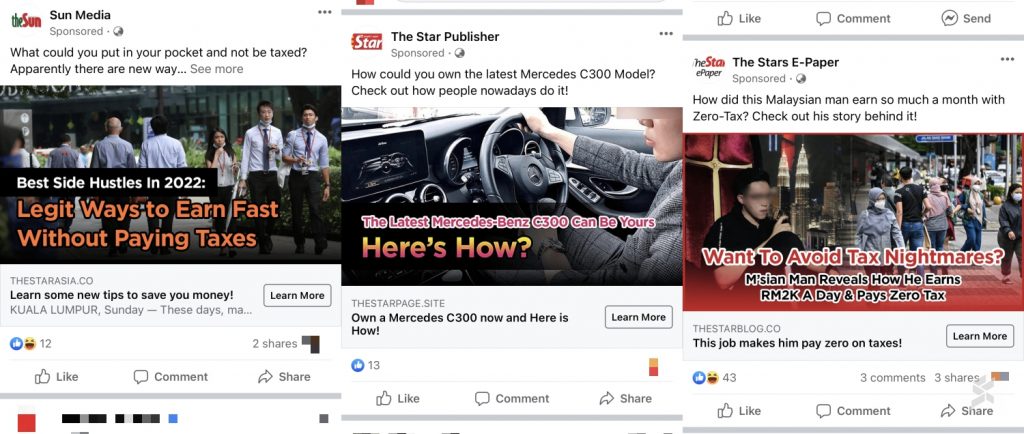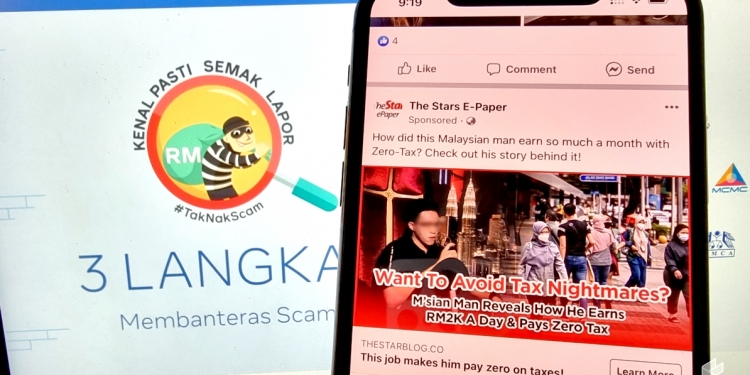Malaysian Communications and Multimedia Commission (MCMC) has recently shared that Meta will provide an update on the current Facebook scam ad situation to Communications and Digital Minister, Fahmi Fadzil on 12th January 2023. The Facebook scam ads are out of control as they impersonate popular brands and public figures with little or no action from Meta even after they were reported. The MCMC has recently followed up with a new statement on the steps it has taken with Meta.
2,731 fake pages have been removed between 2020 to November 2022
The MCMC has provided us with the following statement:
MCMC continuously raised it’s concerns over impersonation and false/scam advertisements on Facebook and social media platforms.
Through our engagement with META, we were informed that the platform has stricter policy on advertising. For fake accounts impersonating organisations , including news portals/banks etc, Meta continues to act based on reports either from the affected party and/or authorities. MCMC is working closely with META in exploring onboarding identified organisations, ministries that are frequently being the target of impersonation/fake account.
Pages below have been removed.
https://www.facebook.com/ComedianteJuancitoCenteno/ (reported to Facebook on 21/12/2022)
https://www.facebook.com/xinzhouribaopaper/ (removed by Facebook)
https://www.facebook.com/papersmy/ (Removed by Facebook)From 2020 until November 2022, a total of 2,731 fake accounts and impersonation pages have been removed by the respective platform providers, upon request from MCMC. The removal is based on violation of platform providers’ terms of service as well as their community standards.
We also have submitted the recent incident of fake Sin Chiew FB page for expedited reviews. The fake account admin are resided/operated in foreign countries. Automated algorithm to weed out impersonation account may take time and platform dependent. MCMC would urge organisations to better manage their brand presence in social media. They must be vigilant in protecting their brand and image from being the target of criminals and scammers.
Malaysian Communications and Multimedia Commission
While the scam ads impersonating Sin Chew Daily have been removed, the fake Kinokuniya Malaysia pages are still up and running. According to the MCMC, a total of 2,731 fake accounts and impersonation pages from various social media platforms including Meta have been removed between 2020 and November 2022 upon request by the regulator. That’s an average of 78 pages per month or 2.6 pages per day, which isn’t much.
In the last paragraph, the MCMC urge organisations to better manage their brand presence in social media and they must be vigilant in protecting their brand and image from being the target of criminals and scammers. While brands can continuously post public service announcements about scam ads, the root of the problem is social media platforms that allowed scam ads in the first place.
Meta’s algorithm to tackle scam ads is clearly not working

As mentioned in MCMC’s previous statement, Meta has existing mechanism to tackle scams and is also exploring other mechanism to prevent such activities from happening again. Despite the various #TakNakScam campaigns launched by Meta, Facebook is seen as aiding and abetting scam activities by approving scam ads to run on its platform. Most of these scam ads can be weeded out easily if Meta performs basic checks on ads or have an active moderation team.
For a company that makes billion of dollars in revenue (USD 27.714 billion for Q3 2022) from ads, it seems that nobody at Meta Malaysia’s office in Kuala Lumpur is capable of acting on scam reports. At the very least, Malaysia should demand Meta to have a localised team capable of moderating ads targeted at Malaysians and to act quickly on reports made by Malaysian users.
New regulatory policies are required to hold social media platforms responsible

All content creators in Malaysia are subjected to the Communications and Multimedia Act 1998, however, the current regulatory policies are not effective in handling platforms hosted overseas such as Meta’s Facebook. As a result, these platforms had to self-regulate using their own content policies.
To keep their platforms safe, social media platforms would have to take their own measures to tackle inappropriate content and scams. For example, TikTok has its own moderation team in Malaysia that can remove videos that don’t comply with their own policies.
When post-GE15 “May 13” videos were reported, the video-based social media platform took immediate action and the videos were removed from TikTok within 24 hours. In fact, TikTok was more proactive by responding quickly and were working closely with both the police and regulator.
That’s something you don’t see with Meta as they hardly issue a response. It is clear that Meta is not taking the situation seriously as they allowed the ads to run for days if not weeks despite public attention to the matter.
Indonesia recently require all digital platforms, both local and foreign, to register as a Electronic Systems Provider (PSE). After registering with the local authorities, these platforms are required to comply with take down requests within 24 hours or within 4 hours if it is an urgent request.
Eventually, Meta’s Facebook and Instagram had to comply by registering at very last minute to avoid a potential ban. Other platforms such as Steam, Epic Games, Dota, Yahoo and PayPal were reportedly blocked by Indonesia after it failed to meet the deadline.
@MCMC_RASMI When are you going to take action ?
— TT🌻🌻the Dream Weaver (@leethingthing) December 26, 2022
Astro seems to be the latest victim. Profile picture shows Kinokuniya, but Name is AstroMalaysia. These scammers seem to be banking on investment, always ‘give away’ Warren Buffet or Teh Hong Piow’s book as a bait. pic.twitter.com/wrBYJFZvGr
While tougher regulations can make foreign platforms “behave” better, the move could be seen as restricting freedom of speech online. We were told by the MCMC that if such policies were to be implemented in Malaysia, it will cover all foreign digital platforms including Netflix and YouTube. This is a delicate matter and it has to be carefully deliberated.
However, something has to be done on a policy level as scams are a major threat in Malaysia and online platforms such as Meta are not showing responsibility. The MCMC could only do so much if Meta is not made liable by our existing laws.
As one person has pointed out, if Meta is so confident in their existing mechanisms, why not they make full compensation to victims who got cheated from ads approved by Meta? Malaysia has given Meta all the time and freedom to act tough on scammers, now it’s time for Malaysia to crack the whip.
For clarity, we are not asking for an all-out ban of Facebook but to make them responsible and accountable for amplifying misinformation and scams through their ad platform. Perhaps Fahmi Fadzil can make it compulsory for all platforms including Meta to impose manual checks for all advertising on their platform (first ads from pages with less than 5,000 likes) and to set up a local moderation team within 3 months. If they fail to comply by the deadline, Facebook should stop serving ads targeting Malaysians. In addition, if Facebook fails to take down a scam ad within 24 hours after it was requested by the MCMC, they should be slapped with fines for non-compliance.
Related reading
- Facebook still allows scammers to run fake ads targeting Malaysians
- It’s time for Malaysia to penalise Facebook for allowing scam ads
- Kinokuniya Malaysia warns of fake Facebook pages scamming users with “free books”
- Social Media scams getting out of hand, Fahmi Fadzil calls on MCMC to take faster, tougher action
- Facebook Scam Ads: MCMC says Meta to update Fahmi Fadzil on 12 January 2023








